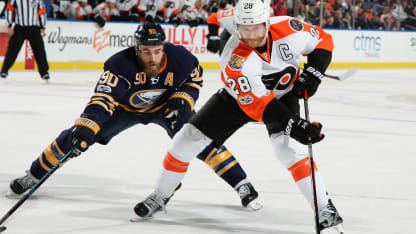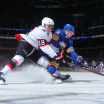Early in the season Giroux was riding the adrenaline that comes with the start of a new season plus the World Cup win, and he had 16 points (four goals, 12 assists) in his first 15 games.
Giroux's strong play didn't last; he had 29 points (eight goals, 21 assists) during his next 49 games, and things on the ice that had been natural for him prior to the surgery weren't so easy.
"When you try to make plays that you used to make and you can't really make them it's frustrating and confusing," he said. "… It was new. You're trying to do the things that you know you can do, it's just not happening. You try to think a little bit too much about how you can be the player you want to be. It's not easy. But it's … you've got to work at it. I think it's more off-ice. You've got to go in the gym and make sure your body is feeling good. Mentally before games you try to make [yourself] feel a little bit better and try to go out there and help the team win."
He said it's been a gradual process of dealing with the residual soreness in his hip while being able to play his game.
"I think when you don't think about that kind of stuff you just go out there and play the game," he said. "When it's in the back of your mind you're not really thinking about the game, you're mostly thinking about your hip, I think it's important to focus on the right things. Even if you don't feel good out there you've got to find a way to feel good mentally.
"I don't think it's one day. It's gradually you start feeling a little better. When you're in the gym and you feel good your confidence is like, 'I'm starting to feel better.' It's exciting. … When you start gaining that confidence back and you know you can make those plays you go out there and make it happen."


















